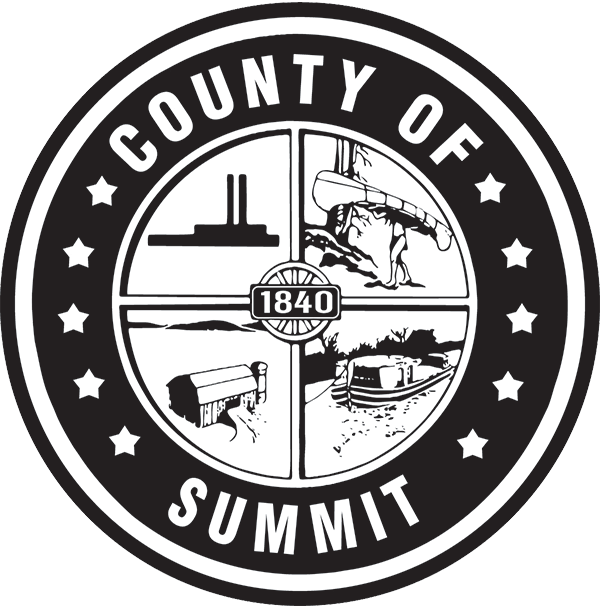Industrial Sewer Customers
Calculation of Extra Strength Surcharges for Significant Industrial Users (SIUs)
SIUs Discharging to Plant 25 (Fishcreek) or Plant 36 (Upper Tuscarawas)
The Summit County Sewer Use Ordinance allows the discharge of wastewater containing up to 800 milligrams per liter (mg/l) Chemical Oxygen Demand (COD) and 500 mg/l Total Suspended Solids (TSS) without any additional charges. The Department may charge industrial users $0.3034 per excess pound of COD and $0.4005 per excess pound of TSS. If the quarterly surcharge for a company’s discharge does not exceed $200, the extra charge doesn’t apply per County policy.
SIUs Discharging to the Akron WRF from County sewers (Mudbrook Trunk)
There is only one industrial user that is currently subject to the extra strength surcharge. The City of Akron imposes a per-pound BOD surcharge ($0.237/lb.) for concentrations exceeding 399 mg/l and a per-pound TSS surcharge ($0.201/lb.) for concentrations exceeding 771 mg/l. If a calculated quarterly surcharge does not exceed $200, the extra charge doesn’t apply per County policy.
SIUs Discharging to the NEORSD Southerly facility (Northern Summit County)
The Northeast Ohio Regional Sewer District’s surcharge rates apply to all industrial users located in the City of Hudson, the City of Macedonia, Northfield Center Township Sagamore Hills Township and Twinsburg Township connected to County sewers. You’re a County customer if you receive a sewer bill from the Summit County Department of Sanitary Sewer Services. Current surcharge rates for these service areas are published in Chapter 6 (1.0603) of the District’s Code of Regulations.
Food Service Fats, Oils and Grease (FOG) Program
The Summit County Department of Sanitary Sewer Services voluntarily began the implementation of a system-wide Fats, Oils and Grease (FOG) program in an effort to minimize the number of Sanitary Sewer Overflows (SSOs) caused by food service grease. The Summit County Sewer Use Ordinance was revised in 2009 to include the following requirements for all food service businesses:
All food service businesses were required to use interceptors to remove grease from wastewater before the water enters the public sewer
All food service grease interceptors are required to be cleaned to the satisfaction of the Director at least once every three months.
Summit County has had an Oil and Grease limit of 100 milligrams per liter (mg/l) in its Sewer Use Ordinance for many years (921.05(b)(12)). The Department decided that it would enforce the 100 mg/l limit for food service businesses, placing higher priority on those businesses where grease blockages had become most common, according to the Department’s Sewer Maintenance section.
Not surprisingly, the areas requiring the most attention from Sewer Maintenance were commercial areas having a high density of food service businesses, including the following:
Montrose – Bath/Copley
Steels Corners – Stow
South Arlington Road – Springfield/Coventry and Green
Macedonia Commons
Even though the areas mentioned above receive the most attention from the Department, the requirements and limits stated in the Sewer Use Ordinance apply to all food service businesses connected to County sewers. The Department is authorized to enforce Ordinance requirements and limits and has the legal authority to impose fines and/or suspend or terminate sewer service to any violator.
Industrial Pretreatment Program
40 CFR 403, the General Pretreatment Regulations for Existing and New Sources of Pollution, was written by the United States Environmental Protection Agency (USEPA) and appeared in the Federal Register on January 28, 1981. The Ohio EPA (OEPA) pretreatment rules (Ohio Administrative Code (OAC) 3745-3), required by 40 CFR 403.4, became effective on November 1, 1984 (as an emergency) and became effective permanently on January 31, 1985. The Summit County Industrial Pretreatment Program, required per 3745-3-03 of the OEPA pretreatment rules, was developed in 1985 and became effective in 1986.
The Summit County Department of Sanitary Sewer Services (DSSS) is required to prepare and enforce site-specific Industrial Wastewater Discharge Permits for industrial customers meeting certain criteria in accordance with 3745-3-03 (C)(1)(c) of the OAC. These criteria include the following:
Customers subject to Federal categorical standards (40 CFR 405 – 40 CFR 471 inclusive).
Customers that discharge industrial wastewater that, in the opinion of the Director, have the potential to cause any of the following:
Collection system or treatment plant interference;
Violations of treatment plant effluent discharge limits;
Unsafe conditions in the collection system or treatment plant; or
Structural damage to collection system or treatment plant infrastructure due to corrosion.
Formal applications are required for industrial users requesting an Industrial Wastewater Discharge Permit or permit renewal. The application package includes the following:
A completed Baseline Monitoring form (for categorical users) or a completed Wastewater Discharge Disclosure Declaration (WDDD) long form (for noncategorical users) and
A complete USEPA water priority pollutants analysis report.
The Baseline Monitoring Form, WDDD long form and the current list of priority pollutants are available on the Industrial Pretreatment page of the DSSS web site.







